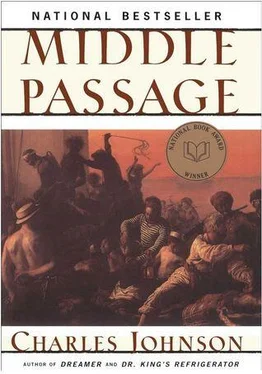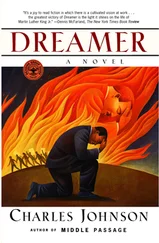“Sir?”
“It came to me as I lay here, a nightmare that this was the last hour of history. Nothing else explains it. The break-down. I mean, how thorough it is, from top to bottom, like everything from ancient times to now, the civilized values and visions of high culture, have all gone to hell in fine old hamlets filled high with garbage, overrun with Mudmen and Jews, riddled with viral infections and venereal complaints that boggle the mind and cripple whole generations of white children who’ll be strangers, if not slaves, in their own country. I saw families killing each other. People were living in alleyways. Sexes and races were blurred. I saw riots in cities and on clippers. Then: the rise of Aztec religion and voodoo as credible spiritual practices for some, but people were still worshiping stage personalities too. On and on it came to me. Crazy as it seems, I saw a ship with a whole crew of women. Yellow men were buying up half of America. Hegel was spewing from the mouths of Hottentots. Gawd!” His whole body shuddered from stem to stern. “I was dreaming, wasn’t I?”
“Maybe, Cap’n. Things’ll never be that way.”
One or two moments went by as he creased on his left side, still as the ship’s figurehead, his skin paggly and scabbed, one of his sock suspenders broken (he had invented, I should record for this record, suspenders that ran from your shirttail to your socks so you never had to pull them up and always had a shirt that looked crisp, smartly starched, and capable of passing military inspection, including after a battle), his face relaxed and voice low, calm as island currents.
“You’re uncommonly quiet ’n’ calculating tonight. Is it ’cause you betrayed me, Mr. Calhoun—”
“Nossir. I did exactly as you asked.”
“True?”
“Your plans, and those of the mutineers, got on the wrong side of the buoy and beached. I’m sorry, sir.”
“Then we underestimated the blacks? They’re smarter than I thought?”
“They’d have to be.”
He nodded, wrinkling his nose at, I presumed, his own fierce odors. “Mr. Calhoun?”
“Here, sir.”
“What’s not changed is that I still need you to be my eyes and ears. I cannot write, so you must keep the log. No matter what becomes of me, I want others to know the truth of what happened on this voyage. Will you do that?”
“Cap’n, I’m no writer. I don’t know how a ship’s log is done.”
“Doesn’t matter. You’re a bright lad. Do your best. Include everything you can remember, and what I told you, from the time you came on board. Not just Mr. Cringle’s side, I’m saying, or the story the mutineers will spin, but things I told you when we met alone in secret.”
To this I reluctantly agreed. I took his logbook from the ruins. But I promised myself that even though I’d tell the story (I knew he wanted to be remembered), it would be, first and foremost, as I saw it since my escape from New Orleans.
“Now, then,” he said, satisfied that I would be his biographer, “can you tell me how the situation stands?”
“The Africans have the ship. We’re steamin’ blind. They want us to lay a course for Senegambia, whereupon the remaining crew will be released, if you can guide us there.”
As I spoke, color faded out of his face. His fists, small-knuckled, squeezed open and shut at his sides. “They don’t own this ship.”
“Captain, they do. You can’t change that.”
“Naw, you don’t understand. Neither do they. The slaves think they’ve wrested the Republic from the crew, is that it?”
“So it would seem.”
“They’re wrong.” Muscles round Falcon’s eyes tightened. “She wasn’t our ship from the start, Mr. Calhoun. Every plank and piece of canvas on the Republic, and any cargo she’s carrying, from clew to earring — including that creature below — belongs to the three blokes who outfitted her in New Orleans and pay our wages. See, someone has to pay the bill. I’m captain ’cause I knew how to bow and scrape and kiss rich arses to raise money for this run. I didn’t come up in the last bucket, you know. I knew how to reach ’em, which wasn’t easy, ’cause they don’t like to be seen. Each one of ’em expects his investment to be returned. Mebbe tripled, like I promised. If we fail, they won’t be forgiving. These are the men we have to appease, not them whoresons and rowdies outside. Oh, I know what you’re thinking. We suffered the unexpected. Surely they’ll understand. But I’m telling you they won’t see nothing ’cept that I took their money — a lot of money, lad — and they’d just as soon see us drown, if I sail home empty-handed, as hear me report their fixed capital seized control of this brig and swung her back to Bangalang.”
The ship’s finances was a field where my ignorance was complete. On economic matters my heart was simple, my mind slow. I kept quiet. But was Ebenezer Falcon telling me that he, at bottom, was no freer than the Africans?
“A month before we left I visited one of these brahmins, my hat in my hands. Oh, I grinned and all but gave him my backside to pat. If any of the hands’d seen me I’d never be able to show my face in public, let alone raise a crew that wouldn’t laugh at me. But it worked, Mr. Calhoun. I was just the crab he wanted, says he, to bring back blacks as valuable as the Allmuseri. I remember going over the crew list with him in his parlor. A simple room, you understand, but long as the main top bowline, filled with pale, eastern light in early morning and simple furnishings such as men of modest means might select. He came to breakfast in a waistcoat cut deep in front, not a wrinkle in his breeches, and his hair combed in a négligé style. A perfect gentleman of taste and proportion is what his toilet told you. All that was to hide the fact he’d made a bloody fortune running slaves and supplies for the British during the last war. See, only poor men put on a show. Which is what I did, ’cause I wanted this contract bad enough to beg for it. I figured this run’d be money for old rope. That easy, you understand? He let me do most of the talking, complimented me on my Latin, my expeditions down the Nile, my schedule for self-improvement, my travels and diverse translations, a few of which (unread) were on his bookshelf behind us ’cause he had a controlling interest in the Boston publishing house that produced them. He let me talk — get it—’cause even though the lubber could barely write his name he didn’t have nothing to prove in this world. He could buy men such as myself with his pocket change. Buy beauty, if he couldn’t produce it. Buy truth, if he was too busy to think. Buy goodness, even, for what blessed thing on God’s earth don’t have its price? Who ain’t up for auction when it comes to it? Huh? Tell me that? All the while I gabbed, squirming in my seat beneath his family’s coat of arms (the head of a Negro), sipping hot coffee from a cup that kept shaking in my hands, he was just smiling and studying me. Not as one man studies his equal — and I was more’n his equal on water or in the wilderness — but the way I’ve seen Ahman-de-Bellah appraise blacks fresh from the bush. I did not like the feeling, Mr. Calhoun. Nor did I like him. He ain’t been at sea for half a dogwatch. I felt closer, if you must know, to the illiterate swabs and heathens I’d gone through hell with on ships and in the heart of stinking jungles. Thing is, he made this voyage possible.” The Old Man was quiet for a long time, his eyes like bits of ice, his complexion paly, whiter than lamb parchment. When he spoke again, his voice was hushed, like a man in church. “His name is Zebediah Singleton, and a third of this tub is his.”
Читать дальше












